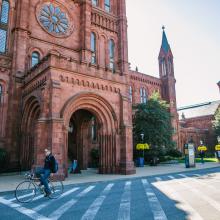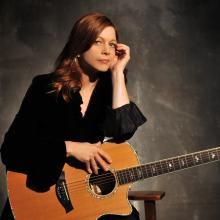quaker
Carrie Newcomer, a musical light-bearer, is a Quaker singer-songwriter who has inspired listeners throughout her career. Her latest release, Until Now (Available Light Records), offers an salve of spiritual renewal. In the past few years we have been through difficult terrain politically and culturally; Newcomer’s music is like dipping our hands in a baptismal font.
Rustin, who died in 1987, is best known for helping Rev. Martin Luther King Jr. implement Gandhian tactics of nonviolence and for the key role he played organizing the 1963 March on Washington and the Southern Christian Leadership Conference — two key components of the civil rights movement.
Less well-known are the particularities of Rustin's faith, including his deep roots in the Quaker and African Methodist Episcopal churches which drove his activism. Those two faith traditions, marked by silence and singing, respectively, echoed throughout Rustin’s life and work.
THE U.S. HAS BEEN on a war footing since at least 1939. Undergraduate students today have never known a world before 9/11, and even their instructors (I was born in 1983) have never known a peaceful America. The Cold War era that preceded our own was enormously bloody in places such as Lebanon, Vietnam, and Afghanistan—and in all these countries, American intervention played a role.
During the Cold War, permanent war footing seemed like more of a threatening novelty than a grinding inevitability. The time played host, therefore, to a global and surprisingly influential peace movement. The Politics of Peace tells the movement’s dramatic story of both ideals co-opted and maybe even betrayed and ideals that shaped our world and might be worth recovering.
The Quran teaches that “verily with hardship, there is relief.” I have found relief in community with Muslim sisters and brothers, with whom I share common virtues and a common future. I love them not despite of my faith, but because of it. After all, Jesus was a Palestinian refugee who loved his neighbors, even those who did not share his Jewish faith. As a Christian, I have no choice but to do the same.

Image via Oksana Tysovska/Shutterstock.com
Museums strike me as a rare public space where we enter with the expectation of learning. And very often we expect to learn through direct contact. That expectation of learning through standing in the presence of something from another time and place makes museums powerful places.

Image via BERNATSKAYA OXANA/Shutterstock.com
As he poured the gallon jug of kerosene over his head, onlookers reacted with disbelief. Before anyone knew what to do, he lit a match. In one terrible instant, 31-year-old Quaker Norman Morrison set himself ablaze in front of the Pentagon, just 40 feet below the 3rd floor window of Secretary of Defense Robert McNamara.
Moments before ignition, Morrison passed his 11-month-old daughter, Emily, to a bystander. His wife and two other children were in Baltimore that day, unaware of what this young husband and father had planned.
Though his terrifying act of self-destruction, Morrison brought the Vietnam War home to a country that was still largely unaware of the widespread atrocities taking place in Southeast Asia. It was hard for most Americans to comprehend the true human cost of U.S. carpet bombing, and the incineration of whole families in the name of peace and security. Even the U.S. military officials leading the war effort did not understand on a visceral level what it meant to burn human beings alive in Vietnam.
Norman Morrison provided a live demonstration.
Several weeks ago at the Minnesota State Capitol building, I and a host of others met with senators and representatives to lobby them on environmental issues. When I met with one senator he said he understood the issues and was on my side. It was a love fest. But when asked about working with the Republicans, the love fest ended.
He started rattling off how the other side will not listen, how there is no communication with them, how they are funded by the Koch brothers and will not compromise or even consider any proposals but their own, and so on and so forth. I do not doubt that he was speaking from personal experience, but if he only sees the other as bull-headed then that is exactly what he will get.
As he spoke I kept saying to myself, "There has to be another way of doing this…"
Last week I discovered "a more excellent way" when I re-read The Journal of John Woolman, the spiritual autobiography of the colonial Quaker who I describe as America’s first social mystic. It my seem odd to look to a colonial Quaker as the model for amending climate change — I say amend because we have already changed the climate; the best goal now is to stop further change and amend our way of live — but his model/witness may be the exact model/witness we need.
In my work on environmental causes I have acted primarily from a place of loss, sorrow, and anger, centering on the loss of my family farm in northern West Virginia. In the mid-1980s, the farm was sold to a coal company who stripmined the farms and destroyed the community. I had had dreams of farming that land.
But if I dig deeper through the loss, through the sorrow, and through the anger, I arrive at a place of love. I love creation, I feel I am a part of it, and I want it to flourish because if creation flourishes, all flourishes.
Here is where Woolman’s witness comes in. His social conscience was formed because Love was the first motion. He was simply responding to that Love.
How did he respond? Eighty years before the modern abolition movement of the 1830s, John Woolman began his personal mission to end slavery amongst Quakers in the American colonies.
In her inimitably lovely way, Carrie Newcomer, the Quaker singer-songwriter, tells the story of June and Emmett and their children gathered at their Christmas table to sing carols and celebrate the birth of Jesus Christ in her should-be classic, "Long Christmas Dinner." It's a celebration of simple pleasures and the powerful quotidian blessings of family, hearth and home.
It's a quiet, soul-stirring tune with images so vivid and familiar they stay with me throughout the year.
We asked Carrie what her favorite Christmas song was and this is what she said...





